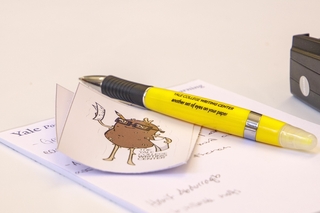Consult the expandable headings below to view an extensive list of downloadable handouts to help improve your writing. The handouts on this page offer guidelines and models that illustrate how good writing works. They can help you motivate and evolve your argument; cite and analyze sources; and compose cohesive introductions, conclusions, and body paragraphs. Use them to improve your writing; then bring your paper to a Writing Partner or a Residential College Writing Tutor for feedback on your work. Printed copies of each handout are available in the Writing Center at 301 York St, mezzanine level.
Introduction Paragraphs - Models and describes a strong introductory paragraph
Body Paragraphs - Models and describes the component parts of a strong analytical paragraph
Research Paragraphs - Models and describes the component parts of a paragraph that uses sources
Conclusions - Models and describes the component parts of a conclusion paragraph
Motivating Moves - Outlines a variety of approaches to answering the “So what?” question
Composing an Effective Title - Presents conventions and strategies for composing titles in various disciplines
Stitching: Signal Words - Lists transition words appropriate in a variety of contexts
Fighting Procrastination - Five tips for getting started on the paper you’ve been putting off
The Process of Argument - Models the critical thinking process that underlies complex, engaged writing
Finding a Good Essay Question - Models how to isolate a meaningful tension or problem
Revising Efficiently and Effectively - Streamlines revision by identifying a hierarchy of concerns
Putting Sources in Conversation: Verbs and Clauses - Lists verbs and phrases that clarify how two sources relate to one another, and to your own ideas
Eight Strategies for Using Sources - Illustrates different ways sources can advance an argument
Working with Quotations 1: The Lead-In - Presents strategies for leading into a quotation
Working with Quotations 2: MLA Citation - Provides an overview of creating in-text citations and Works Cited entries in MLA format
Working with Quotations 2: APA Citation - Provides an overview of creating in-text citations and Reference entries in APA format
Working with Quotations 2: Chicago Citation - Provides an overview of creating citations following the Chicago Manual of Style
Working with Quotations 2: CSE Citation - Provides an overview of creating citations following the Council of Science Editors’ (CSE) guidelines
Working with Quotations 3: Analysis - Discusses analyzing evidence across several levels of abstraction
Citing AI Generated Sources - Provides an overview of citing sources generated by AI
Writing Personal Statements for Graduate School - General guidelines and dos and don’ts for writing personal statements
Basics of Analyzing Poetry - An introduction to poetry terms and guidance for beginning to analyze a poem.
If you have questions, corrections, or suggestions for new handouts, contact Paula Rawlins (paula.rawlins@yale.edu).
Have questions about writing with AI?
Find advice for students looking to understand if, how, and when they can ethically and effectively turn to generative AI for writing support.
-
Writing Resources
Check out our handouts writing skills, examples of strong essays, and additional resources and writing tips.
-
Writing Partners
Meet with a peer writing tutor for low-stakes help with a paper at any point in the writing process.
-
Model Papers
Improve your writing and gather inspiration by reading model papers from across the disciplines.
-
Principles of Citing Sources
Find additional resources on when and how to cite your sources.



